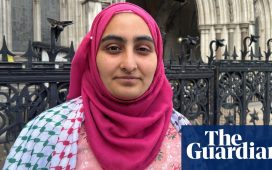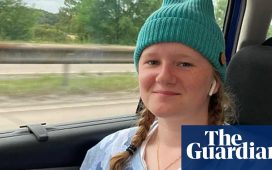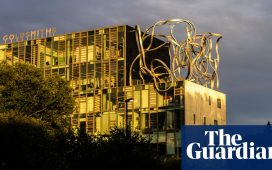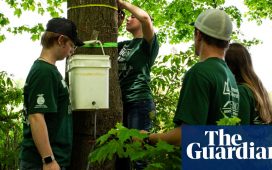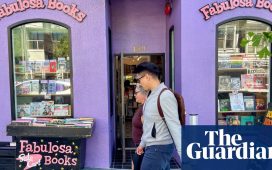Three teachers fresh from training shared their hopes and anxieties in September before starting their first teaching jobs. Enthusiastic and idealistic, they spoke of their desire to make a difference to young people. But beginning their careers during a pandemic has brought extra challenges, so how have they coped?
Jennifer Murch: ‘I thrive on stressful situations’
Teenagers, how fantastic they are! That was what Jennifer Murch said before starting her first full-time teaching job in September. The former navy medic and mature entrant to teaching was looking forward to building relationships with the students and “empowering them to be their best selves”.
Approaching the end of her first term as an English teacher at the Sirius academy, a 1,500-student school in an area of Hull with high unemployment and a range of social problems, does she still admire teenagers? “Yes I do, very much,” she says, and is enjoying building working relationships with them.
“It’s about understanding them as teenagers with their own issues – because it is hard growing up, especially when all teachers seem to do is give them work. It’s also about picking your battles,” adds Murch, who achieved an “outstanding” grade in her first NQT year observation.
“I absolutely love teaching. I genuinely do. Probably because of my time in the military, I thrive on stressful situations. I get to the weekend and I am absolutely shattered, but the thing that I love is being in the classroom with the kids. That is where I want to be. I feel that I am making a difference.”
She also admires how young people tend to be more open-minded than they used to be. “Things have changed a lot since I was at school. I am openly gay; I have a partner, and when I was at school if you came out, that was it, you were bullied. Yet the other week I inadvertently outed myself to my year 10s – by mentioning my partner’s name. Have you got a girlfriend then?, asked one of them. I said yes and she said, oh cool. And that was it. And it’s turned out to be a great way of developing relationships. By being authentic, you’re showing that you are human.”
Hull has had one of the highest rates of Covid-19 infection in England and it is a wonder the school has managed to stay open. “It’s been hard, I’m not going to lie. My real worry is my year 10s, because they missed out through the closures in year 9 and have come back hitting the ground running with GCSEs, and are missing out again through having to self-isolate. We’ve started on Macbeth and if you miss two weeks, you have missed half the play. The class can be on act 3 when some students haven’t even started on act 1,” she says.
“We teachers are having even longer days than usual, covering for each other on a rota basis and giving up our free time for planning, preparation and assessment but we are all pulling together. If we don’t, it’s the students who will suffer.”
Sean Kenny: ‘I’ve felt quite isolated in a bubble with my class’
Sean Kenny, teaching six- and seven-year-olds, went into teaching to make a difference, to be an agent of change for children growing up in working-class homes as he did. His ideals have not changed but he now thinks making a difference and mastering the job may take longer.

“I wanted to underpin my practice with social justice, to put that at the heart of it, but I have also become more aware of the importance of some of the basic things – it has taken me months to learn how to manage a class of 30 children, for example. It’s not that I’m no longer idealistic but it will possibly take years or possibly a whole career to achieve,” he says.
What he has not lost is his creativity. His class at the Commercial primary, Dunfermline, have to follow the school’s protocols for social distancing and hygiene, but they still managed to “visit” Egypt.
“It was the end of a topic on ancient Egypt and I was concerned that they might not realise that Egypt still exists today and they don’t still wear the same headdresses, for example.” So he arranged the classroom like the inside of a plane and put on a pilot’s hat. “We took off and arrived in Cairo, where they had their passports stamped and worked as archaeologists, exposing the outlines of mummies from sand on a tarpaulin I had brought in,” he says. “The children made mock television news reports about their findings and we will use what they saw, heard and smelled for our writing project.
“Parents told me how much they had enjoyed it, one said her daughter told her: ‘I don’t think I am going to be able to do gymnastics tonight because I might not be back from Egypt in time’.”
This week the school had its first confirmed case of Covid and now two classes are in isolation at home. “The pandemic has taken its toll. I’m very lucky with the class I have but because of the pandemic I have felt quite isolated in a bubble with my class without the usual experiences of sharing learning across the school community,” he says.
“In terms of getting to know the staff, I’ve spoken to everyone but there isn’t the same chance to sit down and have a conversation. Teaching is definitely for me but I don’t think I’d want to go into leadership – I want to work directly with the children, not manage adults. The biggest challenges I’ve faced this term have been to do with Covid-19, not the job itself.”
Ibraheem Ali Khan: ‘The best moments are when they suddenly understand’
Completely exhausted, Ibraheem Ali Khan, a science teacher, admits he found his first few weeks difficult. Not only did he have to get used to planning more lessons than he ever had done in his teacher training year, become reacquainted with managing classroom behaviour and coping with piles of marking, he also had to struggle with the restraints of Covid, which hit science hard. Instead of students coming to the labs for practicals, the equipment now has to be taken by the technicians to year groups learning in their block “bubbles”. “It takes a lot of planning to work out what can be moved and used safely and our science technicians have overcome mountains,” he says.

By the half-term in his first job at Outwood Grange academy in his home town of Wakefield, West Yorkshire, he had started to manage his time better. With the help of his in-school mentor and support from more experienced teachers, he got quicker at working out which students needed extra help.
Before starting at the school, Khan talked about his desire to enthuse children about science and what it could do for them. Is that happening? “The best moments are when they suddenly understand. Yesterday I was teaching magnification, and saw that some of the students were struggling, so I went through the questions with them step-by-step, showing when and how to measure cells, and it started clicking. They were able to do the next questions themselves. When you have successes like that, it feels amazing. It’s one of the best feelings.”
Teaching involves long hours, but so do a lot of other jobs, he adds. “I’m enjoying it, despite all the things we have to do differently now to keep everyone safe. I’m pleased to say that I have made the right choice of career.”
